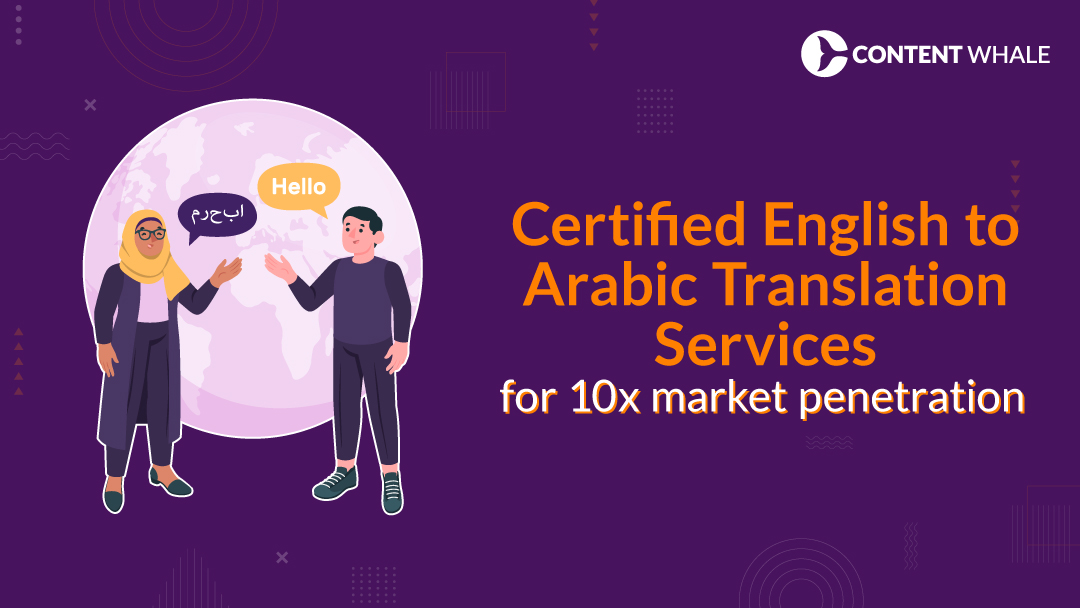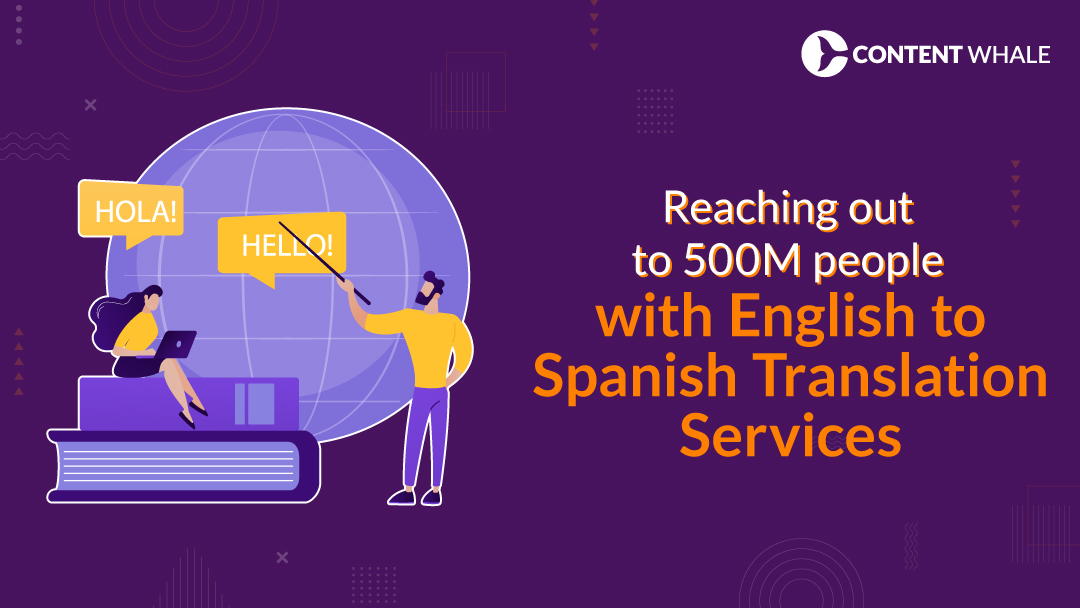For businesses looking to expand into the Middle East and North Africa (MENA) region, Arabic stands out as one of the most vital languages. With over 420 million native speakers across 22 countries, Arabic is not only a dominant language but also a key to unlocking a market rich with opportunities. However, the complexities of the language—ranging from its right-to-left script to its various dialects—demand professional translation services. This blog delves into the nuances of English to Arabic translation services, highlighting the importance of certified translations, the role of professional translators, and the impact of Arabic website localization on business success.
The Global Influence of the Arabic Language

Arabic is a Semitic language with a long history and deep cultural significance. As the official language of 22 countries, including major economies like Saudi Arabia, the United Arab Emirates, and Egypt, Arabic plays a crucial role in international business, diplomacy, and culture. According to a study by Internet World Stats, there are over 183 million internet users in the Middle East alone, making Arabic the fourth most popular language on the web.
Arabic’s influence extends beyond the MENA region. In countries like the United States, France, and the United Kingdom, Arabic-speaking communities are growing, further increasing the demand for Arabic language services. Businesses looking to tap into these markets must prioritize accurate and culturally sensitive translations to ensure they effectively communicate with their target audience.
The Importance of Certified Arabic Translation for Legal and Official Documents
Certified Arabic translation is crucial for legal and official documents that require a high level of accuracy and adherence to local laws. These documents include contracts, court documents, patents, immigration papers, and more. A certified translation ensures that the document is legally recognized and accepted by courts, government agencies, and other official entities in Arabic-speaking countries.
For instance, a contract translated from English to Arabic must be precise, as any misinterpretation could lead to legal disputes or the invalidation of the contract. Similarly, immigration documents require certified translations to be accepted by authorities in countries like Saudi Arabia, where Arabic is the official language.
Content Whale’s certified Arabic translation services are performed by professional translators who are well-versed in legal terminology and the specific requirements of different Arabic-speaking countries. This expertise ensures that your documents are not only accurately translated but also legally compliant, providing peace of mind for your international dealings.
The Role of Professional Arabic Translators in Business Expansion

Expanding into Arabic-speaking markets requires more than just translating words—it requires a deep understanding of the language, culture, and business environment. Professional Arabic translators play a crucial role in helping businesses navigate these complexities and effectively communicate with their target audience.
Linguistic Expertise and Cultural Sensitivity
Professional Arabic translators possess a deep knowledge of the language’s grammar, syntax, and vocabulary. They understand the nuances of Arabic dialects, which can vary significantly across regions. For example, the Arabic spoken in Morocco differs from that spoken in the Gulf countries, not only in vocabulary but also in pronunciation and usage. This makes it essential for businesses to work with translators who can adapt the language to the specific region they are targeting.
Moreover, cultural sensitivity is key to successful communication. Arabic is deeply intertwined with the cultural and religious practices of the region. A professional translator understands these cultural nuances and ensures that the translated content respects local customs and values. For instance, marketing materials that are effective in Western cultures may not resonate with Arabic audiences unless they are carefully localized to reflect cultural norms.
Case Study: Successful Business Expansion Through Translation
Consider the case of a global retail brand looking to expand into the Middle East. By partnering with professional Arabic translators, the company was able to localize its marketing materials, product descriptions, and customer service communications. This not only helped the brand establish a strong presence in the region but also led to a significant increase in sales and customer loyalty. The success of this expansion underscores the importance of working with experienced translators who can navigate the linguistic and cultural complexities of the Arabic language.
The Need for Arabic Document Translation in Multinational Companies

For multinational companies operating in Arabic-speaking regions, accurate document translation is crucial. From internal communications and training materials to technical manuals and financial reports, every document must be translated with precision to ensure that it is understood by all stakeholders.
Consistency and Clarity in Multilingual Communications
Maintaining consistency and clarity across all company documents is essential for effective communication. This is particularly important in industries such as finance, healthcare, and engineering, where the accuracy of technical terms and data can have significant implications. For example, in the healthcare industry, a mistranslated medical report could lead to serious health risks, while in finance, an error in a translated financial statement could result in legal or regulatory issues.
Content Whale’s Arabic document translation services ensure that all your documents are translated accurately and consistently, regardless of their complexity or volume. Our team of professional translators works closely with industry experts to ensure that the terminology and style are appropriate for the target audience, helping you maintain clear and effective communication across all your operations.
How Arabic Website Localization Drives Online Engagement

In the digital age, your website is often the first point of contact between your business and potential customers. For companies looking to expand into Arabic-speaking markets, website localization is essential to engage and convert visitors. Arabic website localization goes beyond mere translation; it involves adapting the entire website to meet the cultural, linguistic, and technical needs of Arabic-speaking users.
The Importance of Arabic Website Localization
Arabic website localization involves several key elements, including:
- Language Adaptation: Translating content into Arabic, including adjusting idioms, expressions, and cultural references to resonate with the target audience.
- Right-to-Left (RTL) Formatting: Arabic is written from right to left, which requires a complete redesign of the website’s layout to ensure that it is user-friendly for Arabic speakers.
- Cultural Sensitivity: Ensuring that images, colors, and symbols used on the website are culturally appropriate and appealing to Arabic-speaking users.
- SEO Optimization: Optimizing the website for Arabic search engines, including the use of Arabic keywords, meta tags, and localized content to improve search engine rankings.
Impact on User Engagement and Conversion Rates
Localized websites are more likely to engage Arabic-speaking users and convert them into customers. According to a study by Common Sense Advisory, 72.1% of consumers spend most or all of their time on websites in their own language, and 56.2% said that the ability to obtain information in their language is more important than price. This highlights the importance of website localization in improving user experience and increasing conversion rates.
Content Whale offers comprehensive Arabic website localization services that include not only translation but also cultural adaptation and technical optimization. Our team ensures that your website is fully localized to meet the needs of Arabic-speaking users, helping you build a strong online presence in the region.
Challenges and Solutions in Arabic SEO

Search Engine Optimization (SEO) is a critical component of any digital marketing strategy. However, optimizing content for Arabic search engines presents unique challenges that require specialized knowledge and expertise.
Challenges in Arabic SEO
- Keyword Localization: One of the biggest challenges in Arabic SEO is keyword localization. Directly translating keywords from English to Arabic can lead to ineffective targeting, as the translated keywords may not match local search habits. For example, a direct translation of “hospitality” might be interpreted as “generosity” in Arabic, which is not relevant to the intended industry.
- Right-to-Left (RTL) Formatting: The right-to-left format of Arabic requires careful consideration when coding and optimizing a website for search engines. Misalignment in this formatting can affect the website’s readability and user experience, which in turn can impact SEO performance.
- Cultural Relevance: Search behavior in the Arab world is influenced by cultural and religious factors. Understanding these influences is essential for developing effective SEO strategies that resonate with Arabic-speaking users.
Solutions for Effective Arabic SEO
Content Whale addresses these challenges through a comprehensive Arabic SEO strategy that includes:
- Arabic Keyword Research: We conduct extensive research to identify high-volume, culturally relevant keywords that align with the search habits of your target audience. This ensures that your content ranks well in Arabic search engines and attracts the right users.
- Technical Optimization: Our team is experienced in optimizing websites for RTL formatting, ensuring that your site is both user-friendly and search engine optimized.
- Cultural Sensitivity: We adapt your content to reflect the cultural norms and values of the target audience, ensuring that it resonates with Arabic-speaking users and improves your search engine rankings.
Why Cultural Sensitivity Matters in Arabic Translations
Cultural sensitivity is a critical factor in the success of Arabic translations. Arabic is more than just a language; it is deeply connected to the cultural and religious practices of the region. This makes it essential for translators to not only understand the language but also the cultural context in which it is used.
The Role of Cultural Sensitivity in Translation
Cultural sensitivity involves adapting content to respect the beliefs, values, and traditions of the target audience. This is particularly important in marketing and advertising, where messages that are effective in one culture may be misunderstood or even offensive in another. For example, certain images, colors, or symbols that are common in Western advertising may not be appropriate in the Arab world.
Professional Arabic translators at Content Whale are trained to navigate these cultural nuances, ensuring that your translated content is not only accurate but also culturally appropriate. This helps you build trust and credibility with your Arabic-speaking audience, which is essential for long-term success in the region.
FAQs that people have about English to Arabic Translation Services:
1. What Makes English to Arabic Translation Services Challenging?
English to Arabic translation services are challenging due to the linguistic differences between the two languages, such as the right-to-left script of Arabic and the complex grammatical structure. Additionally, Arabic has multiple dialects, requiring translators to choose the appropriate variant for the target audience. Cultural nuances also play a significant role, making it essential for translators to adapt content to be culturally relevant and respectful. Content Whale’s professional Arabic translators are well-equipped to handle these challenges, ensuring accurate and culturally sensitive translations across various industries.
2. Why Is Certified Arabic Translation Essential for Legal Documents?
Certified Arabic translation is crucial for legal documents to ensure their accuracy and legal validity in Arabic-speaking countries. These translations must adhere to strict legal standards, as even minor errors can lead to significant legal consequences, including the rejection of documents by courts or government agencies. Certified translations by professional Arabic translators, like those at Content Whale, guarantee that the document is a true and accurate representation of the original, meeting all necessary legal requirements for international use.
3. How Does Arabic Website Localization Improve User Engagement?
Arabic website localization enhances user engagement by adapting your website to meet the cultural and linguistic preferences of Arabic-speaking users. This involves translating content, adjusting the website’s layout for right-to-left reading, and ensuring that cultural references are appropriate. Localized websites are more likely to attract and retain Arabic-speaking visitors, leading to higher conversion rates. Content Whale’s Arabic website localization services ensure that your website is not only linguistically accurate but also culturally resonant, improving user experience and boosting engagement.
4. What Role Does Cultural Sensitivity Play in Arabic Document Translation?
Cultural sensitivity is crucial in Arabic document translation to ensure that the content is appropriate and respectful of the target audience’s cultural norms and values. This is particularly important in marketing, legal, and official documents, where misunderstandings can lead to negative perceptions or even legal issues. Content Whale’s professional Arabic translators are trained to navigate cultural nuances, ensuring that your translated documents are both accurate and culturally appropriate, thus enhancing your brand’s reputation in Arabic-speaking markets.
5. Why Is Professional Arabic SEO Important for Businesses?
Professional Arabic SEO is important for businesses looking to expand their online presence in Arabic-speaking markets. Unlike direct translations, Arabic SEO involves researching and localizing keywords to match the search habits of Arabic users. It also requires optimizing the website’s content, meta tags, and other elements to rank higher on Arabic search engines. Content Whale’s Arabic SEO services help businesses improve their visibility, attract more traffic, and increase conversions by ensuring that their content is optimized for Arabic-speaking audiences.
6. How Does Content Whale Ensure Consistency in Arabic Document Translation?
Content Whale ensures consistency in Arabic document translation by using advanced tools like translation memory, which stores previously translated terms and phrases for reuse. This is particularly important for large-scale projects where consistency in terminology and style is crucial. Our professional Arabic translators also adhere to industry-specific glossaries and style guides, ensuring that your documents are uniform and professional across all translations, regardless of the complexity or volume of the content.
7. What Are the Benefits of Using Professional Arabic Translators for Technical Documents?
Using professional Arabic translators for technical documents ensures that complex terminology and concepts are accurately translated. Technical documents, such as user manuals and engineering specifications, require a deep understanding of the subject matter, as well as linguistic expertise. Content Whale’s translators specialize in various industries, providing precise translations that maintain the integrity of the original document, thereby reducing the risk of miscommunication and ensuring compliance with industry standards in Arabic-speaking regions.
8. How Does Arabic Website Localization Impact SEO Performance?
Arabic website localization positively impacts SEO performance by optimizing the website for Arabic search engines. This includes using culturally relevant keywords, adapting content to the right-to-left format, and ensuring that the website’s structure is optimized for Arabic users. Proper localization improves the website’s visibility in Arabic-speaking markets, leading to higher search engine rankings and increased organic traffic. Content Whale’s expertise in Arabic SEO ensures that your localized website performs well in search engines, attracting more visitors and boosting your online presence.
9. Why Is Arabic Document Translation Important for Multinational Companies?
Arabic document translation is vital for multinational companies operating in Arabic-speaking regions. Accurate translations ensure that all stakeholders understand key documents, from legal contracts to internal communications, reducing the risk of misunderstandings and legal issues. Consistency and clarity in document translation help maintain professional relationships and support the smooth operation of multinational businesses. Content Whale’s Arabic document translation services provide accurate, consistent translations that meet the specific needs of your business, helping you succeed in Arabic-speaking markets.
10. What Are the Challenges of Translating Marketing Materials from English to Arabic?
Translating marketing materials from English to Arabic presents challenges such as adapting the content to fit cultural norms and values, ensuring that the message resonates with the target audience. Arabic’s right-to-left script and varying dialects add to the complexity. Additionally, visual elements like colors and images may need to be adjusted to be culturally appropriate. Content Whale’s professional Arabic translators excel in navigating these challenges, ensuring that your marketing materials are both linguistically accurate and culturally relevant, helping you connect with your Arabic-speaking audience effectively.
11. How Does Arabic SEO Differ from English SEO in Terms of Keyword Strategy?
Arabic SEO differs significantly from English SEO due to the linguistic structure and cultural factors unique to the Arabic-speaking world. While English keywords often have straightforward translations, Arabic keywords require localization to reflect regional dialects and cultural context. For instance, a word commonly used in Egyptian Arabic may not be appropriate in the Gulf region. Additionally, Arabic words can have multiple spellings depending on the dialect and context, complicating keyword research. Content Whale’s approach to Arabic SEO involves thorough keyword research, ensuring that the selected keywords are not only linguistically correct but also culturally relevant and tailored to the target audience’s search behaviors, thus improving search engine rankings and visibility.
12. What Are the Technical Challenges of Implementing Right-to-Left (RTL) Formatting in Arabic Website Localization?
Implementing RTL formatting in Arabic website localization presents several technical challenges, including the need to adjust the entire website’s layout, navigation, and design elements to accommodate the right-to-left script. This often requires reconfiguring CSS and HTML coding to ensure that text, images, and interactive elements are properly aligned. Additionally, certain fonts and icons may not support Arabic characters, necessitating careful selection or custom development. Content Whale addresses these challenges by employing experienced developers who specialize in RTL formatting, ensuring that the website remains user-friendly and visually appealing while meeting the linguistic and cultural needs of Arabic-speaking users.
13. How Do Cultural and Religious Sensitivities Affect Arabic Content Translation?
Cultural and religious sensitivities deeply influence Arabic content translation, particularly in regions where Islam plays a central role in daily life. Content that may be neutral in Western contexts can be interpreted differently in the Arab world. For instance, certain images, phrases, or references that contradict Islamic teachings must be carefully adapted or omitted. Additionally, the translator must be aware of regional variations in cultural practices, such as differences in dress codes or social norms. Content Whale’s professional Arabic translators are trained to navigate these sensitivities, ensuring that the translated content respects local traditions while effectively conveying the intended message.
14. What Are the Benefits of Using Arabic Native Speakers for Website Localization?
Using native Arabic speakers for website localization ensures linguistic accuracy and cultural relevance. Native speakers are inherently familiar with the nuances of the language, including idiomatic expressions, dialectal differences, and cultural references that non-native speakers might overlook. They can also provide insights into local consumer behavior, preferences, and expectations, which are crucial for creating a user-friendly and engaging website. Content Whale employs native Arabic speakers who are not only fluent in the language but also deeply knowledgeable about regional customs and practices, ensuring that your website resonates with Arabic-speaking audiences and enhances user experience.
15. How Does Arabic Document Translation Ensure Compliance with Local Regulations?
Arabic document translation plays a critical role in ensuring compliance with local regulations, particularly in legal, financial, and governmental contexts. Each Arabic-speaking country has its own legal framework, and documents must be translated in a way that adheres to these specific requirements. This includes accurately translating legal terminology, dates, measurements, and official titles. Certified translations are often required to meet the legal standards of the target country. Content Whale’s certified Arabic translators are well-versed in the regulatory environments of various Arabic-speaking regions, providing translations that are legally valid and compliant with local laws, thus mitigating the risk of legal issues.
16. How Does Arabic Website Localization Affect User Interface (UI) Design?
Arabic website localization significantly impacts User Interface (UI) design, requiring a complete overhaul to accommodate the right-to-left (RTL) text direction. This affects everything from navigation menus and button placements to image alignments and scroll directions. Additionally, certain design elements, such as fonts and icons, must be chosen carefully to ensure they are compatible with Arabic script and visually appealing to Arabic-speaking users. Content Whale’s localization services include specialized UI design adjustments that not only make the website linguistically accessible but also enhance the overall user experience, ensuring that the site is intuitive and easy to navigate for Arabic-speaking visitors.
17. How Do Arabic Dialects Influence Marketing Content Translation?
Arabic dialects can significantly influence the translation of marketing content, as each region has its own linguistic variations that affect word choice, tone, and phrasing. For example, a marketing slogan that resonates with a Saudi Arabian audience may not have the same impact in Morocco due to differences in dialect and cultural references. Content Whale’s approach to translating marketing content involves carefully selecting the appropriate dialect for the target market, ensuring that the message is both linguistically accurate and culturally resonant. This tailored approach helps businesses effectively connect with their audience and achieve their marketing goals.
18. What Role Does Arabic Keyword Localization Play in SEO Strategy?
Arabic keyword localization is crucial in SEO strategy as it involves adapting keywords to reflect the linguistic and cultural nuances of Arabic-speaking regions. Unlike direct translation, localization considers factors such as regional dialects, common search phrases, and cultural relevance, ensuring that the keywords resonate with the target audience. This approach enhances search engine rankings by aligning the content with local search behaviors. Content Whale’s SEO services include comprehensive Arabic keyword localization, which not only improves visibility on search engines but also increases engagement and conversion rates by making the content more relevant to Arabic-speaking users.
19. How Can Translation Memory Improve the Efficiency of Arabic Document Translation?
Translation memory (TM) is a valuable tool in Arabic document translation, as it stores previously translated segments of text for reuse in future projects. This not only ensures consistency across documents but also speeds up the translation process by reducing the need to retranslate identical or similar content. TM is particularly beneficial in large-scale projects where maintaining uniform terminology and style is crucial. Content Whale utilizes advanced TM systems to enhance the efficiency and accuracy of Arabic document translation, allowing for faster turnaround times and reduced costs without compromising on quality.
20. How Does Arabic Transcreation Enhance Marketing Campaigns?
Arabic transcreation goes beyond translation by creatively adapting marketing content to resonate with the target audience’s cultural and emotional context. This process involves reworking slogans, headlines, and brand messages to ensure they evoke the same response in Arabic as they do in the original language. Transcreation is particularly important in regions where cultural and religious values play a significant role in consumer behavior. Content Whale’s transcreation services combine linguistic expertise with creative insight, delivering marketing campaigns that not only maintain the brand’s voice but also engage and persuade Arabic-speaking audiences effectively.




